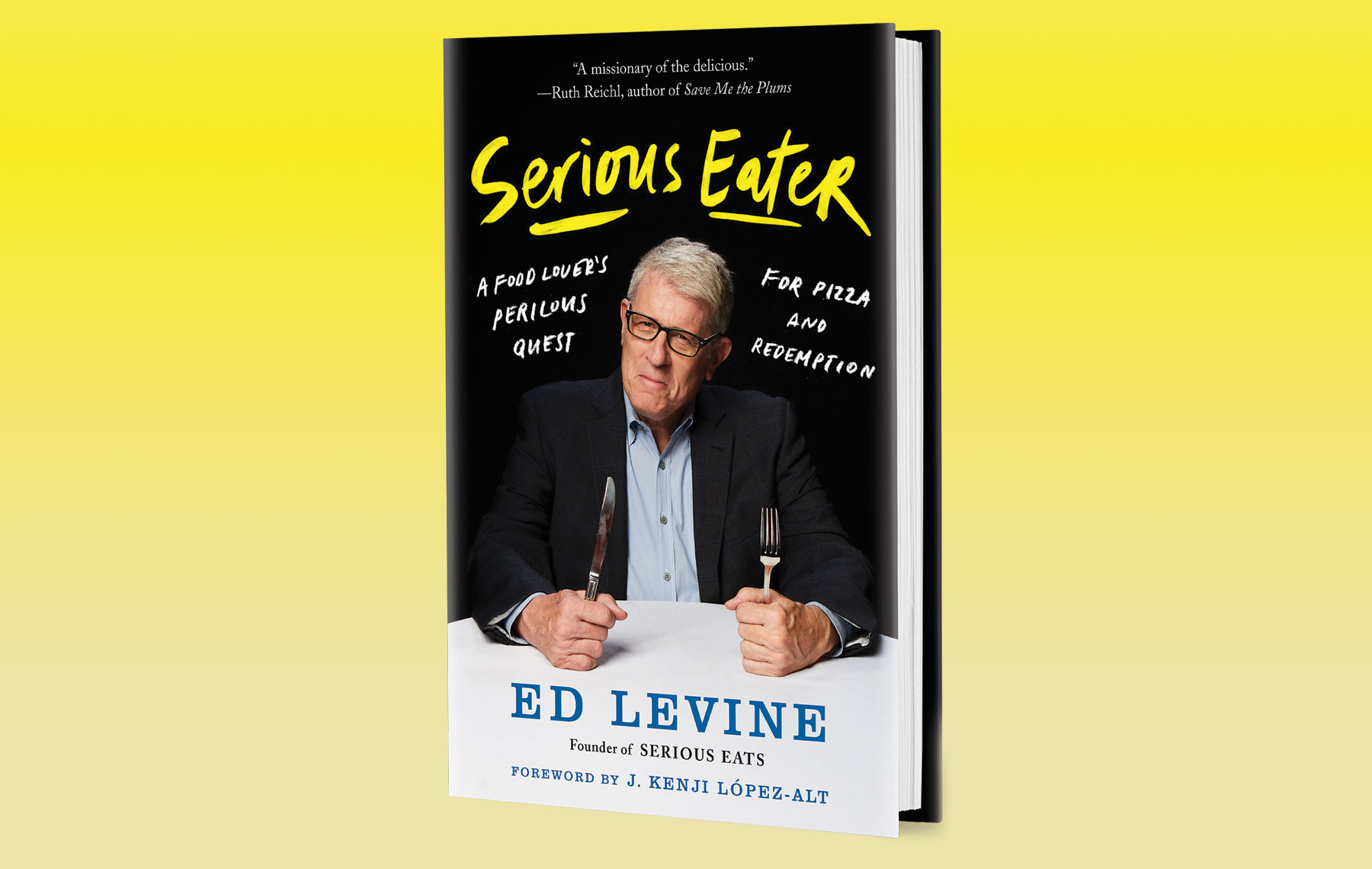
It was pouring rain last week when I attended a live taping of Ed Levine’s weekly “Special Sauce” podcast at the splendid Rizzoli bookstore in Manhattan. I suspect the room was packed to the rafters despite the weather because people wanted to see famed restaurateur and celebrated Shake Shack founder Danny Meyer interview Levine about his new book, “Serious Eater: A Food Lover’s Perilous Quest for Pizza and Redemption.”
Levine achieved notoriety in 1997 when Ruth Reichl, Gourmet magazine’s food editor at the time, called him “A missionary of the delicious.” He was a freelance food writer for high-end publications but it’s the story of how he founded the popular food blog Serious Eats and the subsequent nine-year roller-coaster ride running the foodie tech startup that is captivating.
“Serious Eater” features scrumptious anecdotes, a cache of illustrious food legends and recipes penned by legendary pie-maker Stella Parks of “BraveTart” fame. At the beginning of the book there are suggested listening for each chapter, the other passion Levine highlights. But this soulful tome will stay with you long after you’ve turned the last page and listened to Bob Marley’s “Redemption Song.”
It’s not hard to understand how Levine managed to turn what started as a $100 blog called Ed Levine Eats (known as ELE) into one of the most influential websites about food culture, eventually selling the Serious Eats brand and scoring a James Beard Award in 2010 for being a top influencer in the process.
His parents, like many Jews from poor backgrounds in 1930s New York, were avowed do-gooders and save-the-world types who met at a Communist Party meeting at City College. Their family dinners required the four Levine brothers to participate in discussions about politics, culture and life that reached staggering decibel levels. The house was full of passionate conversation, but the food took a back seat. His mother, a community activist and columnist for their local paper, the South Shore Record, was writing columns about a wide variety of progressive issues but felt cooking was “counterrevolutionary.”
Respite from his mother’s food came every Sunday, when their grandmother Ida came to cook Eastern European Jewish specialties for her grandsons. Levine’s grandmother’s blintzes, latkes, matzo brei and apple cake cemented his connection between food and love but, left to his own devices, the rest of the week he regularly overspent his allowance at his neighborhood candy store. Already a food snob and critic in grade school, Levine went out of his way to get just the right ingredients from different neighborhood purveyors: lunch meat from one place for his sandwich, and the best roll from the corner grocer. His family noted the young foodie’s fixation on ingredients early on and recognized that he was focused on eating the best of everything his allowance money could buy, and sometimes more when he managed to convince the local ice cream shop to sell to him on credit.
But Levine’s childhood was punctuated by tragic losses. His father died prematurely, as did his mother three years later. By his senior year of high school, Levine had relocated to California with his much older brother and sister-in-law, who functioned as surrogate parents to the angry adolescent. Once he was firmly ensconced in L.A.’s food and music culture, Levine’s two life passions took root, as did his tumultuous but loving relationship with his oldest brother, who eventually became the first investor in his food blog.
At the center of the drama is the pull of Levine’s desire to be a crusader for the underdog.
Levine then blossomed at the small liberal arts college in Grinnell, Iowa, where he became the concerts chairman, bringing the who’s who of American music to perform at the school. He earned a bachelor’s degree in American music and set out to “make a difference in the jazz world.”
New York City was the natural habitat of the budding music artist manager but, more importantly, it was where Levine met his future wife, Vicky, an Oxford University Press editor. Instantly smitten, Levine courted his future wife in some of the city’s best fine dining establishments as well as in local dives that inspired his first book, published in 1992. “New York Eats” and its follow-up, “New York Eats (More),” which was published in 1997, were guided to the city’s iconic dishes.
Then, after eating 1,000 slices of pizza all over the country, burgers by the barrel and more hot dogs that a human should probably consume in a lifetime, Levine found himself at the center of the burgeoning obsession with food that was slowly unfurling not only in the city but in all five boroughs. By the time his third book, “Pizza: A Slice of Heaven,” was published in 2005, Levine had established himself as a fixture and authority on the subject, pulling in essays, poems and stories about pizza from famous chefs and writers including writer Nora Ephron, cartoonist Garry Trudeau, chef Mario Batali and eminent food writer Calvin “Bud” Trillin.
In 2006, already sporting a reputation as a connoisseur of American food culture, with more than a few disappointments in the corporate world of advertising under his belt, the then-54-year-old founded the food website Serious Eats.
Serious Eats developed into a community featuring restaurant news, cultural food trends and interactive dialogue among users, restaurateurs and purveyors. It featured articles about chefs and had regular contributors who were experts in food-related content. It also launched the careers of several celebrity chefs, including Kenji Lopez-Alt, who was by Levine’s side from day one, eventually becoming the Serious Eats recipe czar and head scientist in its food lab.
Although the principle story behind Serious Eats is Levine’s effort to monetize the site and make his dream job a reality without too many “suits” involved, the real story lies in his desire to chart his own course, sometimes at the expense of his most precious relationships. At the center of the drama is the pull of Levine’s desire to be a crusader for the underdog — the makers, craftsmen and even the dilettantes that sew together the fabric of the city’s food culture, juxtaposed against the harsh realities of having to “grow up” and make a living. This gap between creativity and honor, the hunger passed down from his parents to “do good” and to work with integrity, often clashed with the pressures of the cutthroat real world, where the primary driving passion is for money.
When I asked Levine what his most unexpected discovery was after finishing the memoir, he told me a story about a fan who stood up in a Q&A session at a promotional event for the book. “Do you understand how many people’s lives you’ve changed with Serious Eats?” the fan asked. It was at that moment, struck almost speechless, that Levine said he realized that his passion for food was a metaphor for other things. His real passion, the one that kept him up at night worrying, aside from the looming sense of failure that’s part of every entrepreneur’s life, was for nurturing and mentoring young writers and then watching them take flight. “The greatest and most unexpected pleasure,” he said, “and a big part of the Serious Eats legacy is the people … knowing that I had some small role in providing a launchpad for their success.”
Readers likely will keep mulling over this work because it is, in essence, a love story between Levine and his parents, his brother, his wife and his talented team of food writers set against a backdrop of his lifelong love affair with New York City. And what a deliciously wild ride it is.
Yamit Behar Wood, an Israeli American food and travel writer, is the executive
chef at the U.S. Embassy in Kampala, Uganda, and founder of the New York Kitchen Catering Co.























 More news and opinions than at a Shabbat dinner, right in your inbox.
More news and opinions than at a Shabbat dinner, right in your inbox.